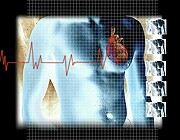
THURSDAY, Feb. 23 (HealthDay News) — The first molecular evidence linking circadian rhythms — the “body clock” — to sudden cardiac death could lead to new methods of diagnosis and therapy to treat or prevent the fatal heart problem, a new study suggests.
Abnormal heart rhythms called ventricular arrhythmias are the most common cause of sudden cardiac death, which is the primary cause of death from heart disease. Experts have long noticed that ventricular arrhythmias occur most often in the morning waking hours, with a smaller peak in the evening hours.
Despite knowing about this increased risk in the morning and evening, scientists haven’t been able to pinpoint the molecular basis for these daily patterns. This study in the March 1 issue of the journal Nature may provide new insight.
The researchers found that a genetic factor called Kruppel-like factor 15 (KLF15) connects the body’s natural circadian rhythm to, and regulates, the heart’s electrical activity.
Too little or too much KLF15 causes a loss or disruption in the heart’s electrical cycle and greatly increases the risk of arrhythmias, according to the study. For example, patients with heart failure lack KLF15 while too much KLF15 causes electrocardiography changes such as those that occur in patients with a genetic heart rhythm disorder called Brugada syndrome.
The findings could reduce the number of cases of sudden cardiac death. For example, medications that increase KLF15 could be given to heart failure patients, particularly during the times of day when sudden cardiac death is more likely to occur.
“Our study identifies a hitherto unknown mechanism for electrical instability in the heart. It provides insights into day and night variation in arrhythmia susceptibility that has been known for many years,” study author Dr. Darwin Jeyaraj, an assistant professor of medicine at Case Western Reserve University School of Medicine and a cardiologist at Harrington Heart & Vascular Institute at University Hospitals Case Medical Center, said in a university news release.
About 325,000 people in the United States suffer sudden cardiac death each year.
More information
The U.S. National Heart, Lung and Blood Institute has more about sudden cardiac arrest/death.

